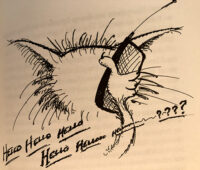I want to submit my first column since Val Robichaud’s death saying that he is in my heart every time I push the send button. He was a dedicated and witty magician – committed to the circulation of words and ideas in this newspaper and for our community.
This one is for you Val.
We all know the rising threat of dictatorships, school shootings and the pressures of living in an expensive town. It’s tempting to feel defeat or cynicism. With all of this and more challenges, no other question seems so urgent to me: how can we shift our world away from conflict and towards reparative conversations – personally and politically? If we can’t talk to each other, work things out, hear each other and resolve differences, build new systems for living fairly, where does that leave us? Fractured, fighting, isolated and at war everywhere, even in our homes and communities.
What’s the key to creating good collaboration and communication instead of domination and destruction? How do you heal a cut? By airing it. At present we use battles, barriers, band –aids, regulations, prisons, rules, taxes, huge corporations, blame, denial, guns, avoidance or compartmentalization, etc.
My psychotherapy clients have taught me what works. If we sit together with a scaffolding, a support system, with suggestions that make difficult dialogues safe, that’s the cure. One of them calls this “rules for war.” When clients quit fighting, it’s because they get to the heart of their conversations, their needs and wishes. They really, really listen to each other, and identify their fears, hurt and needs. They experience dialogue with dignity, not debate. So, I know we can end conflict on the globe if we all participate.
I have written a book about it, coming out this May: From Conflict to Communication, (Lessons from Life and My Therapy Office.) The book poured out of me during the worldwide pandemic. With such shocking isolation I tunneled into a review of my life and what still bugged me relentlessly. I saw clearly the daunting, agonizing consequences of family battles and the losses of things unsaid – not telling the truth. I burrowed into the topic of corruption and why too many human beings are cruel and angry. I witnessed my clients healing simultaneously, working through differences. So, I knew it was possible.
Forty years of being a psychotherapist and life itself has shown me that resolution of conflict is completely possible with a few simple tools. We don’t need division, war, fighting, walls, armor, anger and prejudice running our world. We do desperately need to pledge loyalty to the declaration of interdependence and skilled communication. Not the pathology of dictatorships, privilege, tearing down, greed and destruction.
What shifts argument to productive dialogue? Being “heard” helps clients explore their emotions and wounds. Moving from conflict to understanding themselves and each other shifts gridlock. It’s not always easy. It sounds a lot simpler than it is. I tell my clients it’s like lifting weights at the gym when you’re out of shape. But, you feel better and stronger once you’re in the habit. You’re revived when you’ve had a voice, repaired relationships respectfully and felt heard.
If we stay engaged and reach toward one another, we have a chance at continuing to build community and fairness – if we lean into civil engagement and mending our partnerships.
As Jamie Thompson wrote in a recent Atlantic Magazine article, describing the horror of Uvalde, where so many police stood around instead of protecting the children. He portrays the frozen feeling in so many of us and the symbolism of our country’s collective contempt toward others and the Uvalde officers: “In Uvalde, we watched dozens of cops standing around, waiting, doing nothing. We condemn them, and it gives us someone to blame for the failure to protect innocent children… But our judgment of those officers is ironic. Because as a society, as citizens and legislators, we are those officers: equipped, well meaning – and paralyzed. Standing around, doing nothing, while children are slaughtered.” (3/24 “American Cowardice”)
My question is this: Have we all withdrawn too much or built more battles? Can we value the power of dialogue instead? What could have occurred if those police had had more communication between themselves and the families?
Katy Byrne, LMFT, MA, Psychotherapist and columnist for The Sonoma Sun, Sonoma, Ca.
ConversationswithKaty.com





I’m so sorry for your loss and for that of family, friends and readers of this newspaper. I wonder how many of your readers are willing to subscribe and/or donate to help keep the paper operational during these trying times. I’m willing to help. Let me know the best way to do it.
We’re working on a plan to continue and will notify you and our readers about it soon! Thanks for your support! – Larry Barnett